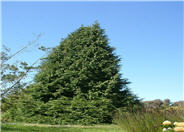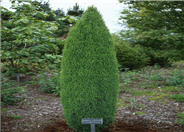
Common name:Leyland Cypress
Botanical name:Cupressocyparis leylandii
The Leyland Cypress is easy to grow, and will become a tall, evergreen tree with a dense crown that is conical to columnar in shape. While its leaf form, size and shape resemble those of the Cupressocyparis nootkatensis, its branchlets are finer, longer and more slender. It combines well with broadleaf evergreens, low junipers, and barberry.

Common name:Jupiter's Beard, Red Valerian
Botanical name:Centranthus ruber
This perennial groundcover will grow 1'-3' high and has medium-size blue/green leaves with red, pink, or white flowers that bloom in the summer.

Common name:Colorado Spruce
Botanical name:Picea pungens
The Picea pungens is a tall evergreen tree that grows to 100' tall. It is broadly pyramidal in form, with foliage varying in shades of blues and greens. This is a highly combustible plant.

Common name:Colorado Spruce
Botanical name:Picea pungens
The Picea pungens is a tall evergreen tree that grows to 100' tall. It is broadly pyramidal in form, with foliage varying in shades of blues and greens. This is a highly combustible plant.

Common name:Dwarf Columnar Juniper
Botanical name:Juniperus c. communis 'Compressa'
This larger shrub will grow 12'-25' tall and has small, scaled dark green leaves.

Common name:Red-Leaf Japanese Barberry
Botanical name:Berberis thunbergii 'Atropurpurea'
A thorny, deciduous shrub growing 4-6' high and as wide, Red Japanese Barberry can be contained with some light pruning in winter. Its purplish-red leaves contrast beautifully against a dark green background. It prefers full sun and regular watering, more in hot summer months. This is a great barrier plant.

Common name:Austrian Black Pine
Botanical name:Pinus nigra
The PInus nigra forms a dense, stout pyramid with a uniform crown. It has slow to moderate growth, and is not usually more than 40' tall. The dark green needles cluster in 2s and 3s, growing 3"-6" in length.
Photographer: GardenSoft
Maintain a two to four inch layer of mulch on the soil surface to reduce weeds, infiltrate rain water, and reduce compaction.
Attract, or buy beneficial insects such as ladybugs and lacewings to control pest outbreaks in your garden.